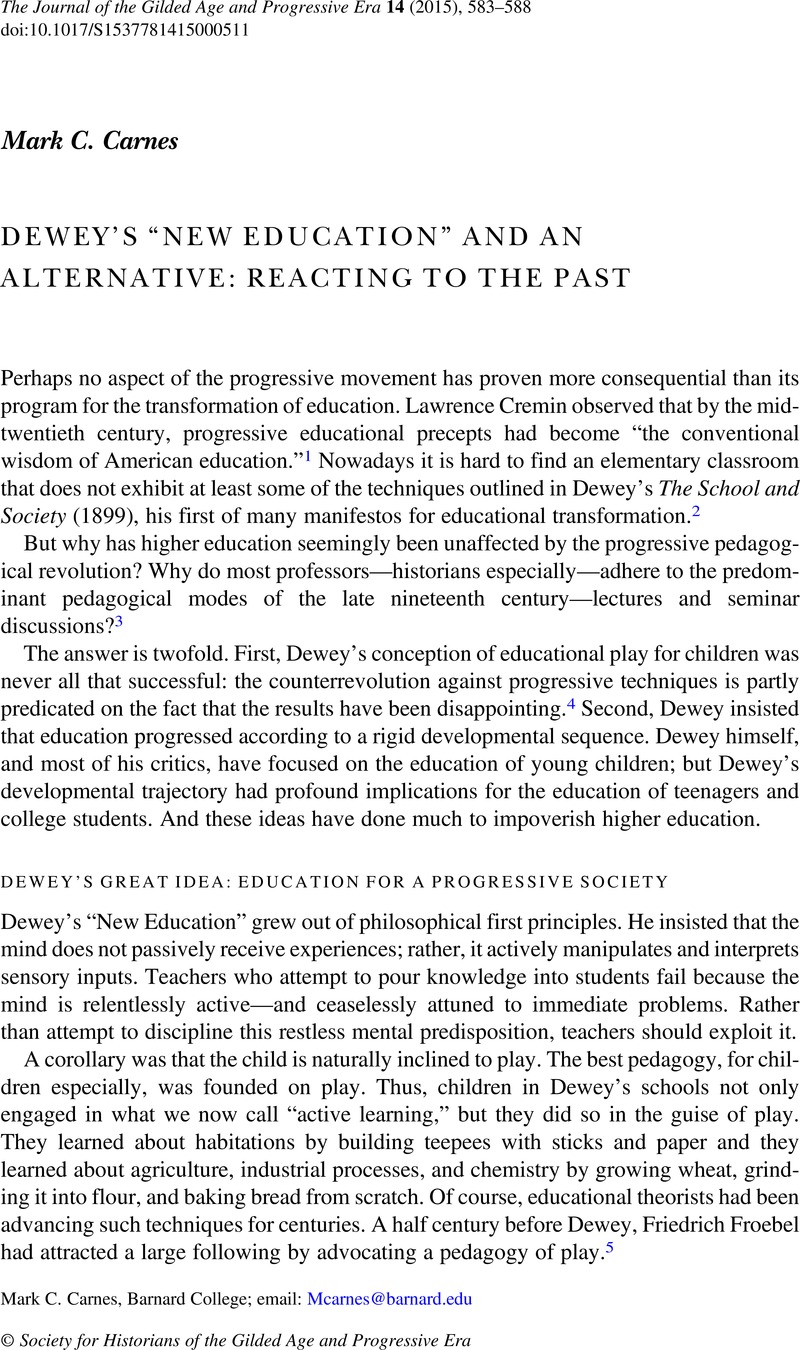No CrossRef data available.
Published online by Cambridge University Press: 02 October 2015

1 Lawrence A. Cremin, Public Education (New York: Basic Books, 1976), 19.
2 John Dewey, The School and Society (Chicago: University of Chicago Press, 1900).
3 When hired to teach history at Harvard in the 1870s, Henry Adams apparently taught the first history seminar in the nation. Yet guiding students in a seminar did not guarantee student engagement: 90 percent of his students “could not be much stimulated by any inducements a teacher could suggest,” in The Education of Henry Adams (New York: Library of America, 1983), 770, 777.
4 See, for example, Kieran Egan, Getting It Wrong from the Beginning: Our Progressivist Inheritance from Herbert Spencer, John Dewey, and Jean Piaget (New Haven: Yale University Press, 2002).
5 In The Republic, Plato suggested that children's lessons should always take the form of play.
6 Dewey, School and Society, 28. Dewey, Schools of To-Morrow (New York: E. P. Dutton & Co., 1915).
7 Dewey, Schools of To-Morrow, 60.
8 Dewey, School and Society, 11.
9 Johan Huizinga, Homo Ludens: A Study of the Play-Element in Culture (Boston: Routledge, 1950).
10 Dewey, Schools of To-Morrow, 43.
11 Alan Ryan, John Dewey and the High Tide of American Liberalism (New York: W. W. Norton, 1995), 141.
12 John Dewey, How We Think (Boston: D. C. Heath & Co., 1910), 162.
13 Ryan, John Dewey, 260.
14 Ryan, John Dewey, 260.
15 www.barnard.edu/Reacting. Readers of this journal will be hard-pressed to create a course composed entirely of Reacting games. Greenwich Village, 1913: Suffrage, Labor, and the New Woman, by Mary Jane Treacy, is the only one of the fourteen published games set in the Gilded Age and Progressive Era. Teams of scholars are working on another half-dozen relevant games, ranging from Montgomery Wolf's game on W.E.B. Du Bois, Booker T. Washington, and the Atlanta Compromise to Jeff Hyson's Hetch Hetchy, which explores the debate over environmental issues and economic development in San Francisco and California from 1908–1913. Treacy, author of the Greenwich Village game, has also written a game, explicitly for high school students, on the Paterson 1913 silk workers’ strike. Other games, in earlier stages of development, explore the Ludlow Massacre, the influenza outbreak in Philadelphia in 1917, and the advent of yellow journalism. Faculty interested in joining these design teams or creating games of their own should contact Dr. Jenn Worth, Outreach Coordinator of Reacting for the Past (jworth@barnard.edu). “Reacting to the Past” games have nothing to do with online gaming.
16 “Ellie” is not her real name. This account is based on her e-mails to the author during February and March of 2015.
17 This account is based on e-mails sent to the author by Kristina, and her coursework.
18 Proctor did not save the note, and so these words are based on what he recalled of it.
19 Fallace, Thomas D., “Was John Dewey Ethnocentric? Reevaluating the Philosopher's Early Views on Culture and Race,” Educational Researcher 39 (Aug./Sept. 2010): 473CrossRefGoogle Scholar.